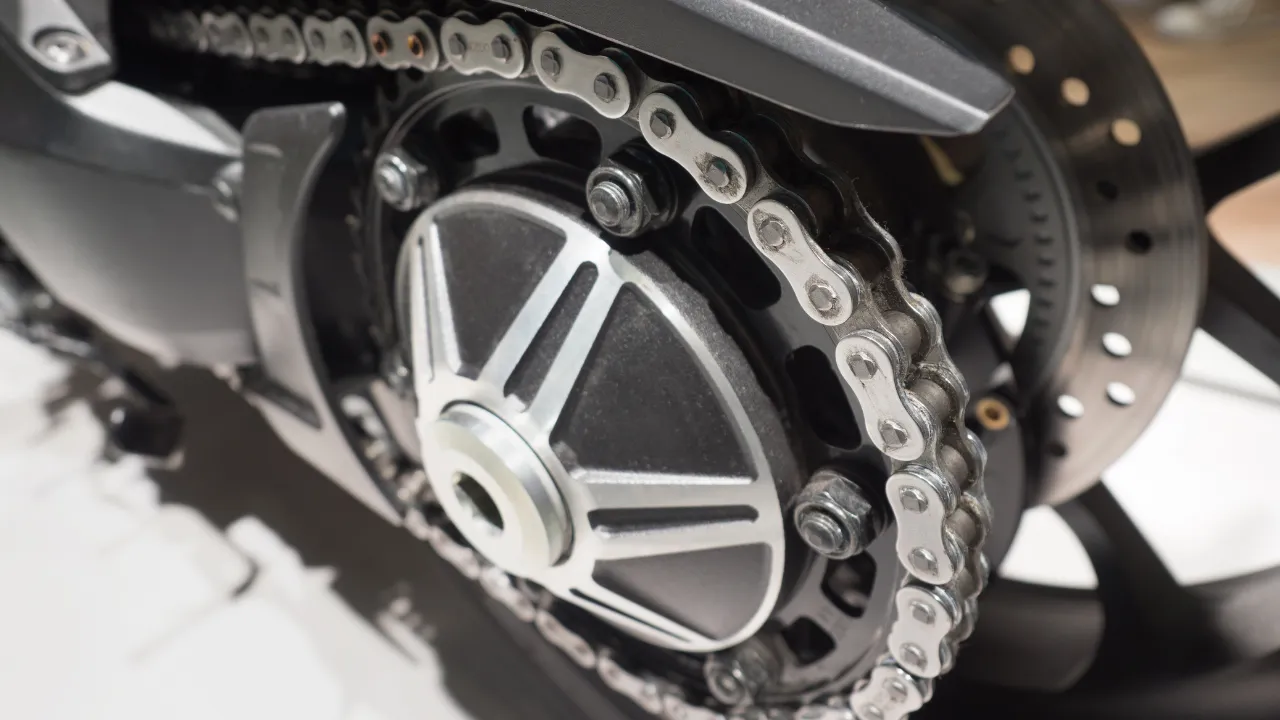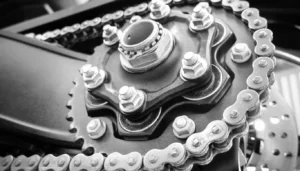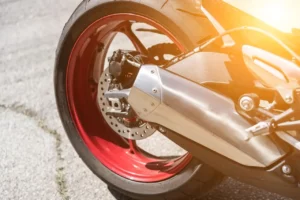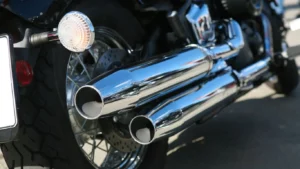It’s true to say that each motorcycle chain makes some clicking noises due to its design. Chains are made of metal.
Proper lubrication and the right chain alignment can reduce this noise to a certain point, but eliminating it is impossible.
As the chain ages, more and more links become stiff. As these links cannot embrace the sprockets perfectly, they become louder when they run over them.
If this clicking is becoming louder it probably means there is a problem and the reason behind it must be resolved.
Structure Of A Motorcycle Chain:
A typical roller chain consists of pins arranged at fixed intervals called the pitch. These pins are covered by cylindrical rollers that ensure a smooth fit over the sprocket teeth. In addition, some plates hold the pieces together.
Modern motorcycles also come with O-rings between the rollers and plates. In this case, the spaces between the rollers are filled with lubrication and the O-rings act as seals. They not only preserve the lubricant but also keeps the dirt and grime from entering the chain.
Now, here are the main causes of chain noise that occur naturally.
- The metal rollers struck against the sprocket teeth.
- The vibration of the rollers and plates at high speeds.
- The vibration of the sprocket.
Noise from the movement of the air and lubrication inside the chain components
some amount of noise from the chain is acceptable. But if you find the motorcycle chain knocking noise disturbing you while riding, it’s time to find out if anything else is wrong.
And the noise from a chain is different from engine knocking sounds or whining from the gearbox.
The big news is, you can take some preliminary steps to fix motorcycle chain noise when accelerating without visiting the mechanic.
Why is My Motorcycle Chain Clicking?
1. A loose or tight chain
If the drive chain has more slack than it needs, there will be a whirring noise. A loose chain will not only affect the power transmission but will also wear out the chain components at a fast rate.
Likewise, if the chain is too tight, it will put stress on the other components of the bike. Such a chain will wear faster and will put more stress on the engine. As a bonus, there will also be spooky noises coming from the chain.
2. A worn-out chain
A worn-out, old drive chain can make more noise.
At times, the rear wheel isn’t aligned properly and the axle is slightly tilted. This causes the rear sprocket to pull the chain in an angular plane that causes the chain to bend.
The consequence is that the slackness in the chain keeps fluctuating based on the wheel orientation. With varying stress on the chain, the chain becomes too loose. Noise can also originate in such a condition.
This can also cause the chain to come in contact with the chain guard or the sprocket cover.
3. Improper Tension and Alignment
One of the leading reasons why motorcycle chains can be clicking is improper chain tension/alignment. Too much slack allows the chain to move up and down too much, which often results in a rattling noise.
Check your manual for the correct slack and set the chain tension based on the manufacturer’s recommendations.
4. Sprocket noise
When the sprocket teeth are worn out, the chain may not fit on the teeth properly. This mismatch will produce a lot of motorcycle chain noise.
Chains and sprockets should always be replaced together.
5. Lack of Cleaning and Lubrication
Grinding and clunking noises from a motorcycle chain typically mean that it’s dirty or isn’t sufficiently lubricated.
Clean the chain carefully with a brush and kerosene or a chain degreaser spray. Then wipe it off and apply some chain lubricant.
In most cases, this simple maintenance can eliminate chain noise!
6. Chain Contacts the Sprocket Cover/Chain Guard
You should also verify that the chain isn’t contacting the sprocket cover or the chain guard.
If one of them is bent, it can even reach the chain causing a chirping noise.
7. Chain is Rusty
Let’s face it, motorcycle chains don’t last forever. Each chain has its wear limit, and if it’s over that limit the chain becomes much noisier.
Besides the excessive wear, rust on a motorcycle chain can also make it much louder and it can even cause the chain to break.
Therefore, to stay safe and reduce the noise it’s recommended that you inspect the chain and replace it if needed.
8. Motorcycle Sprocket Noise
It’s a lesser-known fact that chain click can be caused by worn out sprockets.
If the sprockets are bent or worn the chain can’t engage their teeth perfectly.
Another common problem occurs when a new chain is installed on worn sprockets, as they typically don’t fit perfectly.
As you might assume, this mismatch between the sprockets and the chain can produce a lot of noise.
That’s why it’s advisable to replace the sprockets and the chain at the same time!
9. Loosened Front Sprocket Nut
If a motorcycle’s front sprocket is making noise it can be caused by a loose sprocket nut.
Unbolt the sprocket cover and inspect the front sprocket by moving it side-to-side.
If it has any play, it has to be tightened immediately. The required torque is typically stated in the service manual.
You may want to check the rear sprocket bolts, too.
10. Lack of maintenance
Keep in mind that a dirty and dry chain can make a high-frequency metallic noise. The metal components will wear out faster without lubrication. Besides, a rusty old chain will generate more noise than a new motorcycle chain.
The combination of grit and dirt can play havoc on the metal components of the chain. So, cleaning and lubricating a chain at regular intervals is a must.
How Do I Stop My Bike Chain From Clicking?
A clicking noise often comes from your chain wanting to jump up or down a gear on the rear cassette. This can typically be fixed by adjusting the tension of the cable that runs from your
If it’s the chain or sprocket that is worn out, then, replacement is the only option.
If that’s not the case, there are a few steps that you can take to reduce noise from your motorcycle chain.
Lubricating the chain at regular intervals to reduce friction.
Follow the guidelines mentioned by the manufacturer in this regard. The rule of thumb is to lubricate the chain every 300 to 600 miles after riding. The chain remains warm after the ride and the lube works better.
In addition, always clean the chain properly. Make sure that you use the right cleaner for your chain type.
Inspect the chain for any damage, looseness, or wear
Find out the right procedure to measure chain slack, and adjust it as needed. Check the free play in the chain and also inspect the drive sprocket for any signs of wear frequently. If your bike is a few years old, do this before every ride.
The life of the chain depends on how effectively you use the throttle and the brake. If you want the chain to last longer resist the temptation of going hard on the throttle all the time.
When you use the chain at lower speeds, the striking energy of the metal components is reduced. This reduces the amount of noise generated.
If you’re in doubt about the reason behind chain noise in the motorcycle, it’s best to consult an expert. Let a mechanic inspect your bike and find out what’s wrong.
What Causes Chain Clicking?
The two main reasons behind motorcycle chain clicking are :
- The lack of right tension in the chain
- A worn-out chain or sprocket.
How Do You Reduce Chain Clicking?
The best way to reduce motorcycle dry chain noise is by maintaining the chain in the right manner and keeping the chain tension right.
- Make sure that the chain doesn’t contact the sprocket cover/chain guard.
- Clean and lubricate the chain.
- Adjust the chain tension and alignment.
- Tighten the front sprocket nut if necessary.
- Tighten the rear sprocket bolts if necessary.
- Replace the chain and the sprockets if they are worn out.
- Inspect the primary chain and the transmission for malfunctions.
- Take your bike to a professional.
- Double-check your manual for the right measurement procedure and the recommended amount of chain slack.
Don’t forget to check the tension in more spots on the chain, as there are typically more parts that are too loose and/or too tight in the chain.
On A Final Note
Chains can’t function without giving sound but strange clicking are always a sign of a malfunction, which must be investigated immediately.






